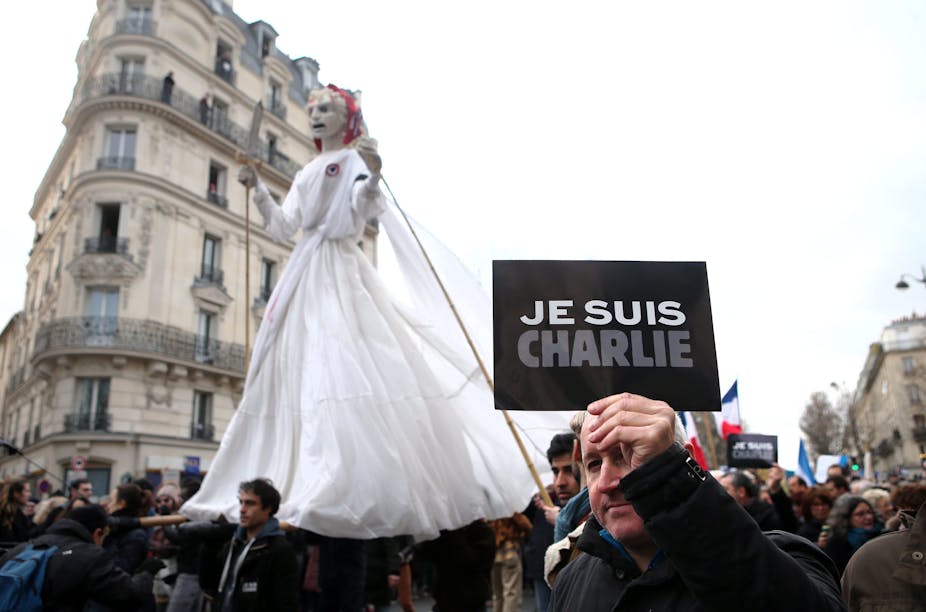Trust Rupert to get new media wrong. Respect, boss, but when the entire freedom-loving world is united in condemnation of the Charlie Hebdo killers and the extremist ideology which inspired them, why take it just that bit too far by blaming the Muslim population of the planet – all 1.5 billion of them – for the events in Paris?
A tweet too far, Rupert, and not good for business, which may be why you apologised. We don’t blame all Catholics for the child abusers embedded in the Church of Rome, do we; or all Jews for the Israeli Defence Force’s use of phosphorous bombs on defenceless Palestinian civilians.
In Murdoch’s defence, it was an emotional, infuriating week, to see progressive French intellectuals massacred for daring to critique a medieval religion, which is propagating itself in the heart of enlightenment Europe, in a society that has embraced and nurtured Islamic migrants for decades.
Not every French person supports multiculturalism, we know, and there are racists in every country, of every ethnic group. The worst act of public racism I ever saw was that of a drunken UK-born Pakistani insulting a black African on the London Underground. But Muslims in France are much freer to go about their business and practice their religion than non-Muslims are in almost any Muslim country one might care to mention.
I don’t agree with the French ban of the veil, which seems to ignore the fact that many of these women, if not most, are victims of an extreme patriarchal ideology which demands their submission to its misogynistic codes. But I understand where that approach came from, and why it might seem reasonable in a society that values secularism alongside freedom, equality, and brother (or sister) hood.
Rupert’s tweet, and the response to it, does raise an important question, however. What are the limits of liberalism? How tolerant should we be of religious intolerance?
Even so-called “moderate” Islam is a belief system transported more or less unchanged from the Dark Ages, before science, democracy, feminism and gay rights achieved acceptance in our liberal capitalist societies. Catholicism did much the same kind of thing, 500 years ago. Islam did not invent religious totalitarianism – no-one expects the Spanish Inquisition, after all. But Catholicism got over it, in a sense, and learned to live with secularism. Islam has yet to do so.
It was disappointing in that context to see “Muslim leaders” condemn Charlie Hebdo’s post-massacre cover for its depiction of “the Prophet”. It suggests that they have missed the point of the universal revulsion shown towards the Paris killers. A religion that cannot live with satire and criticism of its absurdities cannot expect to be accommodated in a liberal democratic society. Islam is not a racial category, but a religious ideology. As such, it deserves no special treatment whatsoever.
That is why we should all post the current Charlie Hebdo cover, at every opportunity. I did ask the editors of The Conversation to illustrate this piece with the cover in question, but they refused. A pity.
Where are the limits, then? Where does liberalism end, and unacceptable accommodation with religious totalitarianism begin? What are the media’s responsibilities in policing that distinction? For myself, I view religion rather like pornography. Anything goes, as long as it involves consenting adults, and no-one gets hurt. I can co-exist happily with all kinds of religious belief, as long as its adherents don’t seek to impose their views on me.
I can even accept the veiled women I see on the streets of Brisbane or Melbourne – an offence to a century of feminist struggle, undoubtedly, and to the (non-Muslim) men presumed to threaten them (or their men) with their predatory gaze – because I have to assume that the women concerned have some choice in the matter. Not my choice but hey, it’s a free country.
We can tolerate this display of female subjugation only as long as we have the right to criticise and satirise it. As I said last week – who cares if Charlie Hebdo, or Private Eye in the UK, or Jon Stewart in the US, or Shaun Micallef in Australia – are funny? We must defend their right to criticise whomever and whatever they think are deserving of criticism.
Politicians, religious leaders, royals, celebrities of the arts and entertainment worlds, prophets, messiahs and gurus – in a democratic culture no-one should be immune from the subversive power of laughter.

